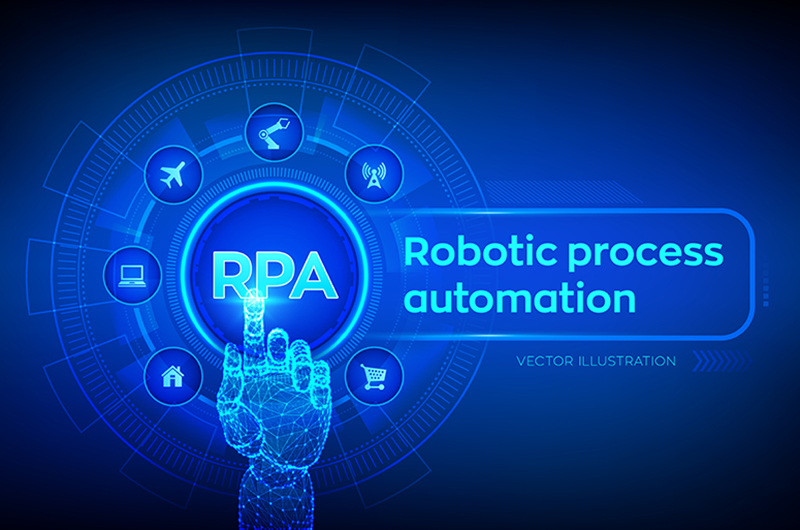Many organizations are now adopting advanced technologies such as RPA, Al, machine learning, and cloud to automate the business processes across enterprises. According to a report from Fortune Business Insights, the global robotic process automation market is expected to grow from $10.01 billion in 2022 to $43.52 billion in 2029. The market is anticipated to grow at a CAGR of 23.4% during the forecast period 2022-2029. With support from a professional RPA company, businesses can now consider achieving end-to-end automation by combining artificial intelligence and machine learning technologies.
|
Read our blog What are RPA and AI? How Do They Work Together? |
Key factors that are expected to drive the market growth are rising adoption of –
- RPA solutions to optimize operations for improving productivity and generating high return on investment
- RPA across healthcare amid COVID-19 pandemic
- RPA-enabled self-learning conversational chatbots
- Advanced technologies such as Al, Cloud, and Machine Learning boosts RPA capabilities
- Platform as a Service (PaaS), Infrastructure as a Service (laaS), and Software as a Service (SaaS) offerings for cloud computing
The RPA market share exhibited growth by 4.2% in 2021 owing to rising demand by healthcare providers amid COVID-19 pandemic. As healthcare providers are adopting automation to speed up the onboarding of remote contact center staff, vaccine manufacturers use RPA services to speed up the development of pharmaceutical medicines and develop numerous vaccinations. Robotic automation bots also assist in scheduling patients’ requests for appointments, and offer 24/7 booking service for patients.These bots assist in handling the high volumes of medical supplies, avoiding delays in critical medical supplies and procurement teams.
However, factors that are restraining market growth are – infrastructure and customization issues associated with RPA. RPA tools require a distinct identity and cutting-edge technology, and upgrading the platform in response to the company’s continuously changing needs is difficult.
Segmentation
The report segments the market on the basis of component, operation, analysis, industry, and region.
By component, the market is divided into software and services. Owing to the surge in adoption of RPA-as-a-Service by enterprises around the globe, the services segment is predicted to hold the largest share. Leading players in the market are expanding and developing advanced technologies such as Al and Cloud native RPA as services. The software segment is expected to grow at a moderate CAGR during this period, owing to the surge in adoption of RPA software across the manufacturing sector to automate repetitive robotic tasks.
On the basis of operation, the market is segmented as rule-based and knowledge-based. The rule-based segment is expected to capture the largest market share as it performs repetitive tasks across industries and automates the workflow. However, the knowledge-based segment is anticipated to record the highest CAGR during the forecast period, as itis likely to experience a rapid adoption after the integration of automation with cognitive technologies such as Al and machine learning.
By application, the market is segmented into analysis, data migration & capture extraction, administration and reporting, customer support, and others. In 2021, the administration and reporting segment held the maximum share, owing to quick and efficient adoption of automation for most of the finance and administration related processes. The analysis segment is expected to exhibit the highest CAGR over the forecast period, due to the rising demand from the banking, finance, and insurance sectors to create reports, invoices, and other day-to-day work.
By industry, the market is segmented into retail, manufacturing & logistics industry, IT and telecom, BFSI, healthcare, hospitality, and others (travel & transportation, education, government).
In 2021, the BFSI segment held the maximum market share, primarily owing to the rising demand for automating the banking processes such as KYC, customer handling, customer, and compliances management. Rising cost of compliances management operations of banks has created ample opportunity for the growth of the RPA software and platforms across the BFSI landscape.
Owing to factors such as the rising utilization of RPA tools for several healthcare processes such as admissions and discharge, clinical data interoperability, and health plans, the healthcare segment is expected to grow with the highest CAGR during the forecast period. Similarly, the rising digital transformation in the IT and telecom industry is likely to surge the demand for software. Owing to the rising data complexity, the manufacturing and logistic industries are also set to grow in the near future.
Region-wise, the RPA market share is fragmented into five major regions – North America, Europe, Asia Pacific, the Middle East & Africa, and South America. They are further categorized into countries.
Owing to the rising adoption of self-regulated advanced technologies such as Al and machine learning, North America is expected to hold the largest market share in the global market during the forecast period. Rising penetration of automation software, solutions, and processes among the enterprises and government agencies in this region aids the market growth.
Asia Pacific is anticipated to be the fastest-growing region, primarily due to the rising adoption of these solutions across the automotive manufacturing industry. Several leading players are expanding their RPA product offerings in Asia Pacific.
The demand for RPA tools from European countries such as Germany, the U.K., and Italy is also high. Increasing adoption of advanced technologies such as cloud computing and Al in South America also drives the market growth. Due to lack of industrial investments, the Middle East & Africa and South American countries have shown slow adoption of RPA, compared to other regions.
Key industry players profiled in the report include Automation Anywhere (U.S.), Blue Prism Group PLC (U.K.), UiPath Inc. (U.S.), Microsoft Corporation (U.S.), Nice Systems Ltd. (Israel), WorkFusion, Inc. (U.S.), Pegasystems, Inc. (U.S.), OnviSource, Inc. (U.S.), Salesforce (Servicetrace GmbH/Mulesoft, Inc.) (Germany), and Kryon Systems (U.S.). Most key players are expanding their operations by adopting several strategies such as mergers, acquisitions, collaborations, and partnerships
The demand for these solutions across organizations is increasing to handle complex data, information, and to automate business processes. Many government organizations and private companies are also investing in creating conversational RPA chatbots for automating their processes. Firms can rely on experienced business process outsourcing companies for RPA support.




